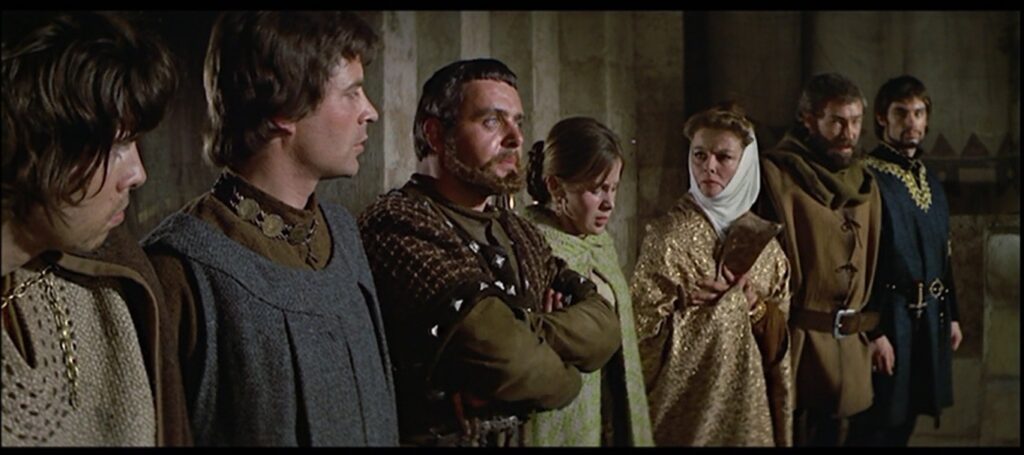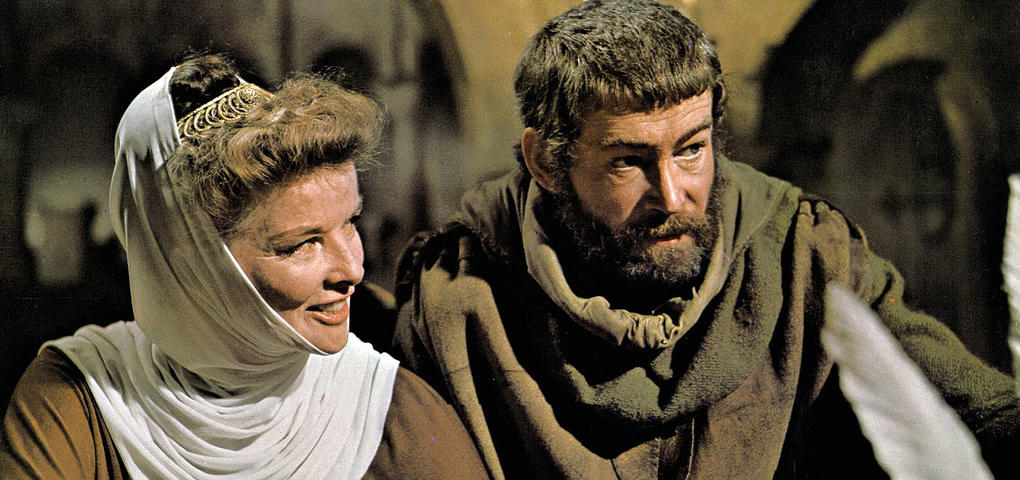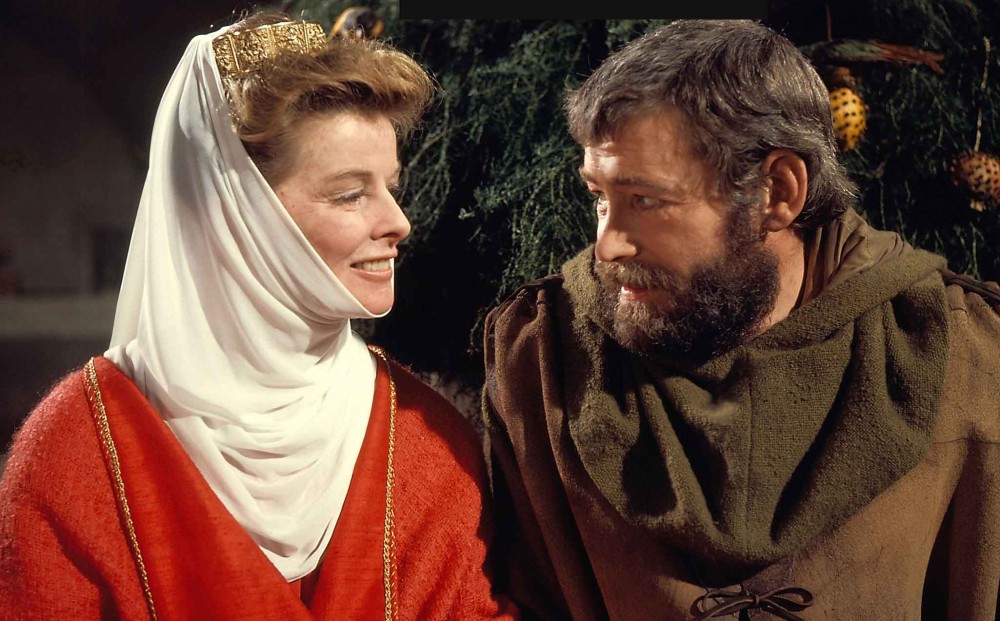Christmas, season of peace and good will to all men, when families congregate by the hearth to eat, drink and rejoice in the warmth of each other’s company. Unless you’re a Plantagenet, in which case you’d best keep your wits sharp and a blade handy.
It’s December 1183 and Henry II (Peter O’Toole), King of England, Lord of Ireland, Duke of Normandy and of Aquitaine and Count of Anjou has decided to hold a Christmas court at Chinon and summons his family to attend. There’s Richard the Lionheart (Anthony Hopkins, in his first major film role), Henry’s eldest surviving son and a fearsome warrior; Geoffrey (John Castle), a master schemer utterly unhampered by scruples; John (Nigel Terry), the last and least of the brothers; and their mother, Henry’s estranged wife Eleanor of Aquitaine (Katharine Hepburn), whom he imprisoned after she led their sons in a revolt against him.
Joining the happy band is Alais (Jane Merrow), the French king’s sister, ostensibly betrothed to Richard but actually Henry’s mistress, and Philip II (Timothy Dalton, making his film debut), the aforementioned King of France, who demands either Alais’ wedding or the return of her dowry.
All eyes are upon the question of succession. The Angevin empire Henry rules is the wealthiest and most powerful force in Western Europe, but Young Henry, Henry and Eleanor’s eldest son, has died and the king needs a new heir. Henry favours John, Eleanor favours Richard, Philip will cut a deal with whoever makes him the best offer and no one thinks of Geoffrey except Geoffrey himself. The corridors of Chinon resound with plot and counterplot, much to Henry’s delight. “I’ve snapped and plotted all my life,” he tells Alais. “There’s no other way to be a king, alive and 50 all at once.” If only he’d paid more attention to the ominous Latin chanting in the opening credits. (The magnificent, Oscar-winning score is by John Barry.)

The Lion in Winter is a film about violence—most of it emotional and psychological and all the more brutal because it’s perpetrated by and against family and friends. No bond is sacrosanct and no cruelty off limits. Even sweet Alais is vicious—her claws are simply smaller than the rest.
The scheming and snarling would be bleak if wasn’t all so funny. Screenwriter James Goldman adapted his own play, preserving its coruscating wit and netting himself an Oscar in the process. Eleanor’s preferred means of greeting her offspring is to attack their flaws and insecurities, beaming all the while and when Henry, in one of his many ruses, asks her for some peace she replies, “Only a little peace? Why not eternal peace?”
The Yuletide setting is part of the joke. Alais sings carols and there are wrapped presents under a (likely ahistorical) tree, but John’s idea of a gift for his father is a toy figure of an executioner decapitating a prisoner. He made it himself; the severed head pops off and everything.
Irreverence is one of the film’s virtues. For a story about royalty, there are few crowns on display and so little pomp and circumstance that when Henry formally receives Phillip, he does so by striding across a dirt courtyard cluttered with dogs and chickens. Goldman and director Anthony Harvey know the Plantagenets are the stuff of legend—quite literally in the case of Richard, John and Robin Hood—so they remind us that they were, first and foremost, people. No one is a caricature, except perhaps John. Then again, over 800 years after his death John remains notorious for his cruelty and managing to lose his crown jewels in the Wash. Presenting him as a churlish brat seems almost generous.

The most complex portraits are of Henry and Eleanor. Peter O’Toole roars and laughs and needles and gloats and is magnificent as a man who doesn’t just think he’s invincible; he knows it. He had played Henry once before in Becket (1964), where the king’s friendship with Thomas Becket (Richard Burton) begins to disintegrate the moment he places an archbishop’s mitre on the latter’s head. The Lion in Winter works well as a companion piece: an older, greyer Henry still tearing great chunks out of life, but with no one to share it with.
No one save Katharine Hepburn’s Eleanor, a woman so thrillingly alive, cinematographer Douglas Slocombe pauses to pay her homage as she arrives at Chinon, the camera sweeping over her as she smiles. Eleanor fights because fighting is all she has left—and because she excels at it. “Fragile I am not,” she tells Alais and neither is Hepburn, who shines as brightly as any diamond and cuts twice as deep. Her performance won her her third Oscar for Best Actress.
The entire cast is outstanding. Anthony Hopkins is wonderful as Richard: rigid and unyielding, yet surprisingly vulnerable. John Castle—soon to join an even more dysfunctional ruling family in I,Claudius—gives Geoffrey an air of sardonic detachment which occasionally slips to reveal the pain underneath. Nigel Terry makes the most of John’s immaturity and incompetence. And Timothy Dalton is all silky insouciance as Philip, a manipulator who still has much to learn.
The Lion in Winter is thoroughly entertaining, a tale of political intrigue and dynastic squabbles that also finds room for reflections on love, mortality and the ties that bind families together. Henry, Eleanor and their sons may devote the majority of their waking hours to finding new ways to manipulate each other, but family is family. And as Eleanor herself muses, “What family doesn’t have its ups and downs?”

Leave a Reply